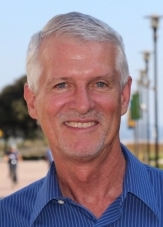Fall 2019 Joint CSC@USC/CommNetS-MHI Seminar Series
 |
James Rawlings,
University of California, Santa Barbara
|
Abstract
State estimation can be posed as an optimal control/tracking problem. From this perspective, the stability and robustness properties of the estimator should be derivable from the properties of the optimization problem, as is commonly done in the analysis of Model Predictive Control. To achieve this goal in state estimation, we introduce a Lyapunov-like function, termed a Q function, and show that for general nonlinear systems satisfying a nonlinear detectability assumption and a nonlinear, incremental stabilizability assumption, the optimal full information state estimate is robustly asymptotically stable in the presence of bounded process and measurement disturbances. We also show that the state estimate converges to zero for asymptotically convergent disturbances. These general theoretical results are illustrated by application to some numerical examples using the freely available software CasADi/MPCTools for solving the optimal control problems. Implications of these full information results for moving horizon estimation are also discussed.
Biosketch
James B. Rawlings received the B.S. from the University of Texas and the Ph.D. from the University of Wisconsin, both in Chemical Engineering. He spent one year at the University of Stuttgart as a NATO postdoctoral fellow and then joined the faculty at the University of Texas. He moved to the University of Wisconsin in 1995, and then to the University of California, Santa Barbara in 2018, and is currently the Mellichamp Process Control Chair in the Department of Chemical Engineering, and the co-director of the Texas-Wisconsin-California Control Consortium (TWCCC). Professor Rawlings's research interests are in the areas of chemical process modeling, monitoring and control, nonlinear model predictive control, moving horizon state estimation, and molecular-scale chemical reaction engineering. He has written numerous research articles and coauthored three textbooks: “Model Predictive Control: Theory Computation, and Design,” 2nd ed. (2017), with David Mayne and Moritz Diehl, “Modeling and Analysis Principles for Chemical and Biological Engineers” (2013), with Mike Graham, and “Chemical Reactor Analysis and Design Fundamentals,” 2nd ed. (2012), with John Ekerdt. In recognition of his research and teaching, Professor Rawlings has received several awards including: election to the National Academy of Engineering; William H. Walker Award for Excellence in Contributions to Chemical Engineering Literature from the AIChE; “Doctor technices honoris causa” from the Danish Technical University; The inaugural High Impact Paper Award from the International Federation of Automatic Control; The Ragazzini Education Award from the American Automatic Control Council; and The Computing in Chemical Engineering Award.
